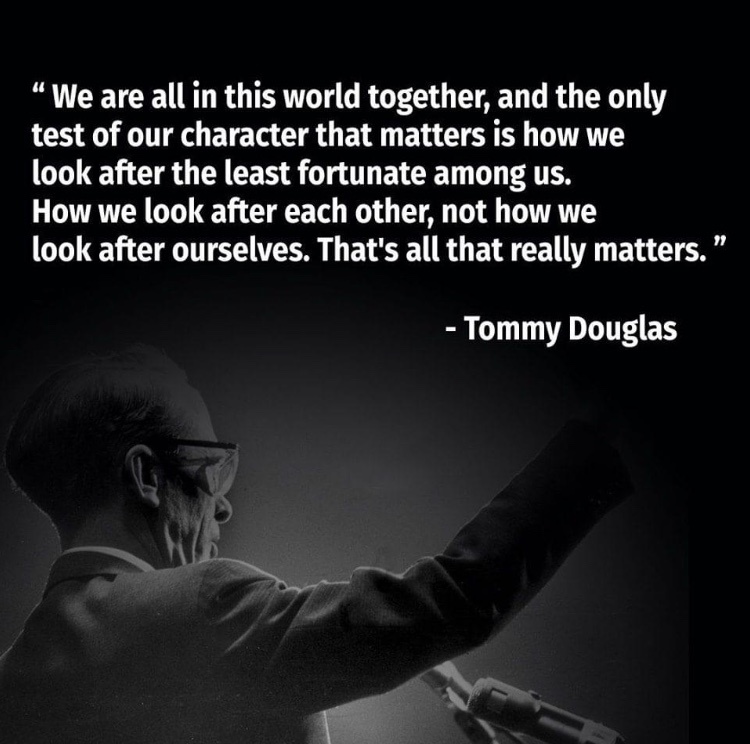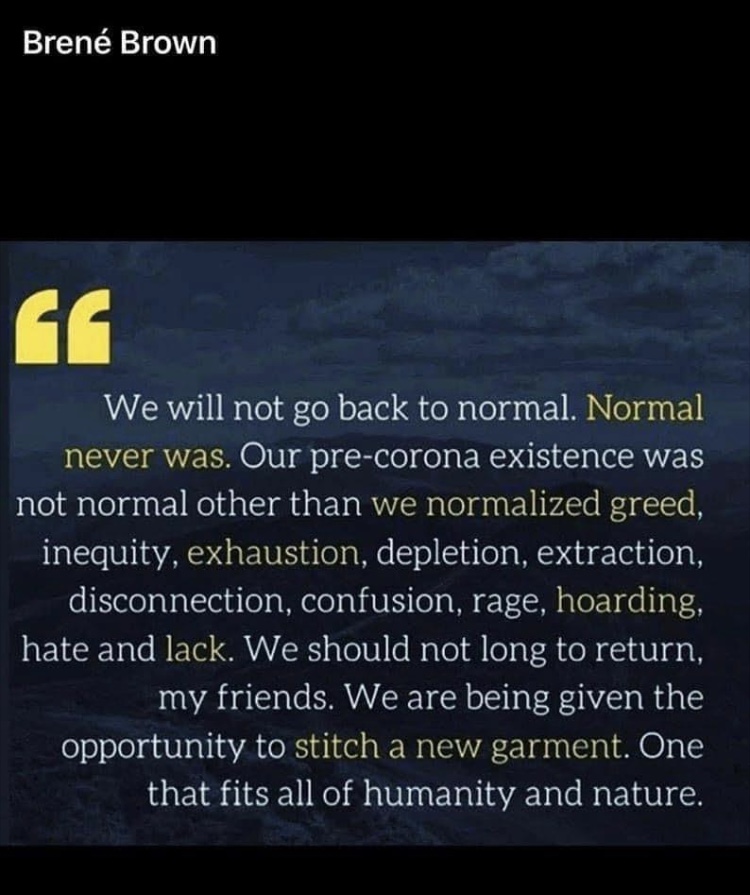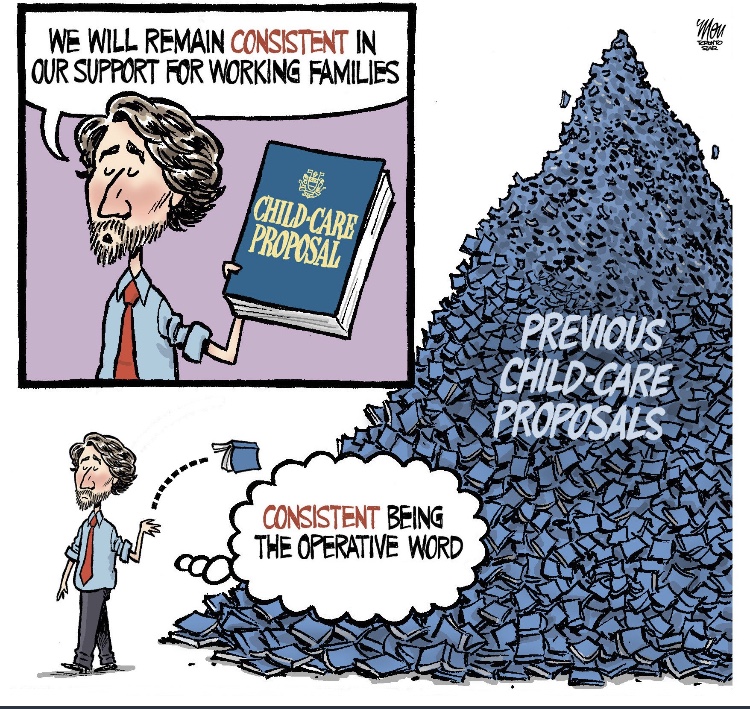
Why We Can’t Go Back To “Normal” »
The coronavirus has exposed the failures of the pre-pandemic economy and social services. Rates of infection are reaching record numbers and fears of massive economic and social harm are growing. Where do we go from here? We cannot go back to the old “normal”.
An economy that worships rugged individualism and enables extreme wealth in few hands, is an ideological and moral failure. Wealth and economic power equates with political power. Oligarchies jeopardize freedom and democracy.
It must be countered before it’s too late, with a solidarity and politics based on empathy and justice, stepping beyond oneself, to others – an empathy that embraces our common destiny and future – as humans and for the health of the earth – for future generations.
It necessitates an activism and demanding through elections and citizen-empowering politics, holding large corporations responsible for harming the environment and exploitation that enables inequality. It means demanding taxation and policies that put human well-being above profit. And, of upholding human rights and combatting intolerance and hate.
We must not stop at merely “recovering” from the coronavirus pandemic. We need to step out of the old “isms” if we are to tackle systemic racism, rising intolerance and hate, concentration of power in the hands of few and the crisis of climate change. We must not go back to business as usual or stifling incrementalism. We cannot wait. We must be bold!

Canada needs investments for innovation and improving productivity – such as infrastructure, skills training and education, green technology, combined with substantial enhancements in health and social services to lift the country out of inertia and declining standards of living.
“Investments after the Second World War were instrumental in propelling an era of strong productivity growth and economic prosperity. Strong, sustainable growth would also help us manage the heavy debt load that has piled up over the last decade and will continue to pile up because of COVID…by improving the government’s capacity to keep its revenues growing comfortably faster than its debt-service costs.” 1
The pandemic has demonstrated the importance of front-line and essential workers. We have banged pots, thanking them – and then we stopped. The large corporations have cut pandemic pay raises and deepened their massive profits. Caring isn’t temporary, only for a crisis. It is a principle that should be permanent in a successful and healthy society.
So what will this require? We must demand bold changes. There is no shortage of ideas: a guaranteed livable wage; enhancements to public health care to include Pharmacare, dental, eye and mental health care; social programs that that make our communities more resilient and equitable; end bailouts to companies that pollute, worsen the climate crisis or do not treat their employees equitably; childcare and education – the pathways to economic participation, higher productivity and democratic empowerment; public transit, efficient buildings, green infrastructure and technology.
A reform of taxation lies at the heart of achieving these transformative changes. The ultra-wealthy must return a fair share of their wealth to society and large corporations must pay a fair tax rate. Tax evasion and off-shore tax havens must be aggressively pursued and loopholes shutdown. Forty years of cutting taxes and repeatedly cutting them, again and again, has been a dismal failure, depriving governments of vital revenues and public investments.
Governments could also, for example, look at nationalization or creating public utilities in areas such as high quality broadband, indispensable to work and economic progress, if the private sector is unable or unwilling to address the public necessity of universal, affordable access. We’ve done it before, such as with Hydro, and it works.
The pandemic has exposed the false notion adopted by Liberal and Conservative parties that governments need to get out of the way, that less government is better, of deregulation and privatization. We need look no further than long-term care homes, shortage of PPE, cuts to pandemic preparedness and warning programs, and to science. And, the list grows.
We have seen the necessity and value of government and public programs to help us get through this pandemic when we needed it most. There are lessons to be learned. Let’s not forget them.
- Carolyn Wilkins, Senior Deputy Governor of the Bank of Canada, Globe & Mail, Report on Business, November 13, 2020, p. B3.
Bill Sundhu
Bill Sundhu is a Canadian lawyer and former judge with more than 35 years of experience in the courts of justice.
His current practice includes trial and appellate advocacy in criminal justice, human rights and civil liberties. Bill has broad legal experience that includes criminal justice, family law, child and youth law, indigenous rights, police misconduct and wrongful deaths, non-discrimination, access to justice, law reform and legislation, professional legal responsibility, and judicial independence and administration.
He is a regular speaker, lecturer and media commentator on human rights, justice, diversity, equality and international legal issues. He has extensive knowledge of the Canadian justice system and international human rights law, with particular interest in international criminal law.
Bill has three university degrees, including a Masters degree in International Human Rights Law from Oxford University. He practices in Canadian and International Law.
His work is recognized by appointment to the List of Counsel for the International Criminal Court in the Hague (war crimes, genocide, crimes against humanity) and selection to a panel of international experts to train judges in Tunisia, in 2013-14 in human rights and administration of justice. He has served an extensive term as an Executive Member of the Canadian Bar Association National Criminal Law Subsection.
Bill is a founding member of the BC Association of Multicultural Societies and is an advocate for equality and diversity. He and his family have made Kamloops, British Columbia, their home for the past 24 years.
My Blog Posts Visit My Website
